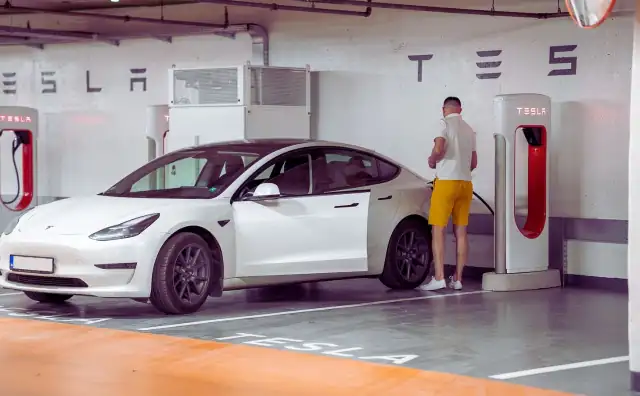
SOFIA, Bulgaria — As of June 15, Tesla owners in Bulgaria must now pay to charge their vehicles at the company’s Supercharger stations in Sofia and Plovdiv.
The move, reported by Capital, marks the end of free charging at Tesla’s proprietary network in the country, with the American electric vehicle manufacturer implementing a new standard pricing policy.
Drivers are now charged 0.75 leva per kilowatt-hour (kWh) of electricity consumed. In practical terms, charging a Tesla with a 75 kWh battery — a common capacity — would cost approximately 56 leva.
In addition to energy costs, Tesla has introduced idle fees of up to 4 leva per minute for drivers who leave their cars parked at the charging station after charging is complete, a measure aimed at encouraging efficient station use.
The change affects all Tesla models using the network in Bulgaria, including older vehicles that previously enjoyed free lifetime Supercharging — a perk once offered to early adopters of the brand.
The update was quietly communicated to users through the vehicle interface just a day before the new pricing came into effect, according to the Carlife by Dani automotive blog.
Tesla has not released an official statement explaining the policy shift, but industry observers suggest that it is likely linked to the European Union’s Regulation 2023/1804.
The new regulation, which became active in April 2024, mandates that all newly installed EV charging stations with a capacity above 50 kW must support on-site payment methods — including credit cards and mobile apps — and must be accessible to all electric vehicle brands. The regulation also requires that users receive clear, upfront pricing.
While Tesla has historically restricted its Supercharger network to Tesla vehicles, the company has recently begun opening select sites to other EVs across Europe in line with EU requirements.
This trend is expected to continue in Bulgaria, particularly with the shift to paid services that offer transparent pricing and payment flexibility.
As of June 1, there were over 3,200 Teslas registered in Bulgaria, making up nearly 16 percent of the country’s roughly 21,000 electric vehicles, according to data from the Ministry of Interior.
Despite not having an official dealership or service center in Bulgaria, Tesla remains the most popular EV brand in the country. Most vehicle deliveries are made through the company’s operations in Germany and Austria.
Automotive blogger Rangel Rangelov, who operates Carlife by Dani, views the change as potentially beneficial in the long term.
“Paid charging may be the first step toward expanding Tesla’s infrastructure in Bulgaria,” he noted, pointing to the need for more fast-charging locations and upgraded facilities to meet growing demand.
With electric vehicle ownership on the rise, the shift toward paid charging — while unpopular with some early adopters — reflects broader trends across Europe.
As EV infrastructure matures, users can expect to see more uniform pricing models, improved access, and greater interoperability across charging networks.
